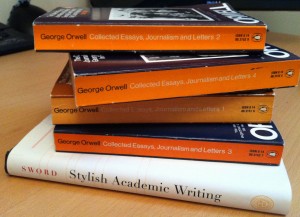 Displacement is a wonderful thing! I have millions of pressing emails, a paper to revise and several strategy documents to perfect but I have had the pleasure this evening of hunting my book shelves for a lost book, well four in fact. The books in question are penguin editions of the George Orwell’s Collected Essays, Journalism and Letters. I found the first three quickly, but the fourth was elusive lost behind a double stack of paperbacks ranging from a Quiet Flame, Solo, Trinity Six, Death Zone, Outliers, Frozen in Time amongst many others, which gives just a hint of the lack of order on my shelves and the eclectic nature of my reading habits. Most of my shelves are double, or in some cases triple, stacked with book cases in the living room, bedrooms, on the landing and in my office in the roof! So why the fuss about Orwell’s collected essays? Well my mother – a former English teacher, turned academic – set me reading Orwell’s journalism (which is far better than his more famous novels in my humble opinion) in my late teens as a model of good written style. With titles like Boy’s Weeklies, The Decline of the English Murder, Death of an Elephant, Good Bad Books and What is Science who could resist? The piece I was actually looking for was Politics and the English Language in which Orwell spells out his rules for good prose, basically five simple rules to good style. Sadly, and to my amazement, you can find these rules on the Internet now; in fact on the British Council web site as guidance for foreign students wanting to write good English!
Displacement is a wonderful thing! I have millions of pressing emails, a paper to revise and several strategy documents to perfect but I have had the pleasure this evening of hunting my book shelves for a lost book, well four in fact. The books in question are penguin editions of the George Orwell’s Collected Essays, Journalism and Letters. I found the first three quickly, but the fourth was elusive lost behind a double stack of paperbacks ranging from a Quiet Flame, Solo, Trinity Six, Death Zone, Outliers, Frozen in Time amongst many others, which gives just a hint of the lack of order on my shelves and the eclectic nature of my reading habits. Most of my shelves are double, or in some cases triple, stacked with book cases in the living room, bedrooms, on the landing and in my office in the roof! So why the fuss about Orwell’s collected essays? Well my mother – a former English teacher, turned academic – set me reading Orwell’s journalism (which is far better than his more famous novels in my humble opinion) in my late teens as a model of good written style. With titles like Boy’s Weeklies, The Decline of the English Murder, Death of an Elephant, Good Bad Books and What is Science who could resist? The piece I was actually looking for was Politics and the English Language in which Orwell spells out his rules for good prose, basically five simple rules to good style. Sadly, and to my amazement, you can find these rules on the Internet now; in fact on the British Council web site as guidance for foreign students wanting to write good English!
I have always consciously, and now largely unconsciously, followed these rules when I can and they are pasted at the end for those who are interested. Any way I was put in mind of these rules last week while on leave and reading a book entitled Stylish Academic Writing by Helen Sword published by Harvard University Press. The book is a classy piece of work on writing good academic prose and is based on an exhaustive survey of over a thousand academic papers across ten disciplines and amusingly a survey of leading academic style guides and self-help books. This thought provoking book provides useful information for social scientists, scientist, lawyers and psychologists; in fact all flavours of researcher. The central thesis is about choice; the choice of academics in the matter of style, to challenge the stifling prose of academic convention! Off course this is going to appeal to me and is elegantly summed up by ‘choice is the stylish writer’s best weapon against the numbing forces of conformity and inertia’ (p. 30). I think you get the idea that I quite like this book and I would recommend it to both seasoned and novice academic writers, but in truth Orwell’s rules will always reign supreme with me!
- Never use a metaphor, simile or other figure of speech which you are used to seeing in print.
- Never use a long word where a short one will do.
- If it is possible to cut a word-out, always cut it out.
- Never use the passive where you can use the active.
- Never use a foreign phrase, a scientific word or a jargon word if you can think of an everyday English equivalent.
- Break any of these rules sooner than say anything outright barbarous.
George Orwell, Politics & the English Language, p169 Collected Essays, Journalism & Letters Volume 4, Penguin 1970











 Join the 17th Annual Postgraduate Research Conference – Wednesday 3 December 2025
Join the 17th Annual Postgraduate Research Conference – Wednesday 3 December 2025 BU Festival of Social Sciences invite at RNLI
BU Festival of Social Sciences invite at RNLI MaGPIE Presents at UK Parliament: From Mass Graves to Courtroom
MaGPIE Presents at UK Parliament: From Mass Graves to Courtroom Festival of Social Science: Introducing drowning prevention in Bangladesh
Festival of Social Science: Introducing drowning prevention in Bangladesh ECR Funding Open Call: Research Culture & Community Grant – Apply Now
ECR Funding Open Call: Research Culture & Community Grant – Apply Now MSCA Postdoctoral Fellowships 2025 Call
MSCA Postdoctoral Fellowships 2025 Call ERC Advanced Grant 2025 Webinar
ERC Advanced Grant 2025 Webinar Horizon Europe Work Programme 2025 Published
Horizon Europe Work Programme 2025 Published Horizon Europe 2025 Work Programme pre-Published
Horizon Europe 2025 Work Programme pre-Published Update on UKRO services
Update on UKRO services European research project exploring use of ‘virtual twins’ to better manage metabolic associated fatty liver disease
European research project exploring use of ‘virtual twins’ to better manage metabolic associated fatty liver disease
So Orwell on language is more interesting than his writings on poverty and war…..surley not. As for rules that start with “never” I say never follow them if it detracts from committed writing (see Sartre for more on this)
Best
Rs
Please see link below to article from Helen Sword from The Times Higher:
http://www.timeshighereducation.co.uk/story.asp?sectioncode=26&storycode=421045&c=2
All sound advice, but this is funnier:
http://www.plainlanguage.gov/examples/humor/writegood.cfm
This site made me laugh! Thank you for adding the comment!